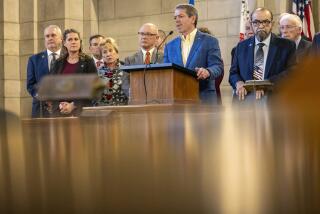EDUCATION : College-Bound Students Win in Georgia Lottery : Critics say game-funded scholarships are too generous, but Gov. Miller says it’s about grades, not income.
- Share via
SUWANEE, Ga. — Students chat happily between classes on the sprawling North Gwinnett High School campus. It’s spring. The school year is almost over. The uncertainty of the future lies ahead.
Many in the 248-member senior class have turned their thoughts toward college--and the new state scholarship program called HOPE, or Helping Outstanding Pupils Educationally.
The most far-reaching state scholarship project in the nation, HOPE is funded entirely by lottery revenues.
Some critics say the program is too generous. Others question what will happen if lottery revenues fall. Still others are concerned that the lottery is played mostly by low-income people who can least afford it.
But Eric Cochling, 18, who will leave this small town 30 miles northeast of Atlanta to enter the University of Georgia in the fall, said: “HOPE is allowing me to go to college. I come from a one-parent family. My mother couldn’t really afford to pay very much.”
Classmate Chris Prevatt, 18, who is headed for Georgia Tech to study chemical engineering, said: “HOPE is helping many students who otherwise couldn’t afford college.”
The program, which currently benefits more than 40,000 students at Georgia’s colleges, universities and technical schools, is the brainchild of Gov. Zell Miller.
As the 1994 school year draws to a close, guidance counselors across the state are swamped with students seeking information on HOPE. The grants cover tuition, mandatory fees and a $100-per-quarter book allowance for any of the state’s public colleges or universities.
Any high school senior with a B average and family income of less than $100,000 qualifies. College freshmen who maintain a 3.0 average and whose family income stays below $100,000 will be covered for all four years. HOPE also will give $500 to students selecting an in-state private college or university.
To critics who feel the $100,000 cap is too generous, Miller responds: “I don’t see this as a program about income levels. It’s about scholarship. It’s about keeping good grades.”
And HOPE pays the full tuition for students enrolled in the state’s two-year technical colleges, regardless of grades or family income. Those who earn a high school equivalency degree are awarded a $500 voucher to be used for educational expenses.
Thirty-one percent of lottery revenues are appropriated for education. Those funds are divided among the HOPE scholarships; pre-kindergarten for at-risk 4-year-olds, which is benefiting 10,000 children; and a special equipment and capital needs program that is designated for onetime expenditures, such as computer labs for all Georgia schools.
And as a safeguard against declines in lottery revenues, 10% of the education money is deposited into a reserve fund.
When the lottery’s first fiscal year ends June 30, projections are for total revenues exceeding $898 million, with at least $280 million earmarked for education. That would put Georgia at the top in first-year per capita lottery sales of $132.05, breaking Florida’s record of $128 and far surpassing California’s $32.85
Unlike some states that lump lottery money in with the general funds, Georgia laws are precise about how lottery revenues are divided, deposited and distributed. The 31% designated for education is deposited into a Lottery for Education account, 50% is returned as prizes, 14% is budgeted for operating costs and 5% goes to lottery retailers as commissions.
“The wisest thing we did in Georgia was to dedicate the lottery proceeds to specific areas . . . that it not be put into the general fund and frittered away like it is in most states,” Miller said.
Unlike Georgia, for example, where no lottery revenues can be used for teacher pay, California devoted over 90% of the $625.9 million from the 1993 lottery to teacher salaries and benefits.
Georgia’s lottery met with great opposition when first proposed, but it now appears that a great cross-section of Georgia’s citizens are playing the games. In a recent University of Georgia poll, almost 54% of those surveyed said that they had played. More than 86% reported they spend less than $5 per week on the games.
And it’s not just Georgians playing. With no lottery in four of the five bordering states, ticket sales are strong at retail outlets along the state lines, the Georgia Lottery Corp. said.
Extolling the popularity of the games, lottery spokesman Chuck Reece said: “Most people aren’t playing the lottery because they think it’s going to help education. . . . They’re playing because they think it’s fun.”
Cochling, the North Gwinnett senior, is more philosophical. “If people are going to waste their money gambling, why not put it to good use?”
More to Read
Sign up for Essential California
The most important California stories and recommendations in your inbox every morning.
You may occasionally receive promotional content from the Los Angeles Times.













